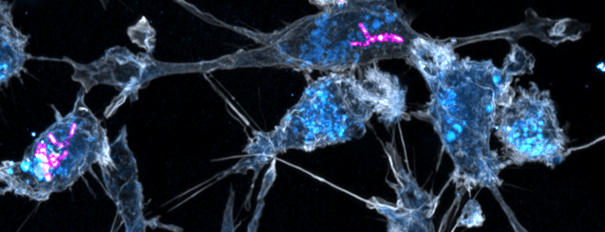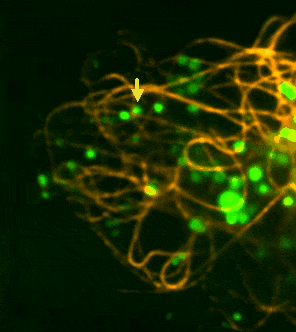Host-Microbe Interactome

Tuberculosis (TB), caused by the bacterium Mycobacterium tuberculosis, remains one of the deadliest infectious diseases globally. Millions are affected each year, and the rise of multidrug-resistant and persistent infections emphasises the urgent need for innovative research into host–pathogen interactions. Our research group investigates at the cellular and molecular level how pathogenic mycobacteria exploit host‐cell lipid metabolism to survive, persist and cause disease.
The lab is physically located at the CSSB in Hamburg (https://www.cssb-hamburg.de/) and is affiliated with FZB as well as the Biology Department of the University of Hamburg. This unique affiliation allows us to combine advanced imaging infrastructure, mass spectrometry lipidomics and infection biology in a multidisciplinary setting.
Research Focus
The core aim of the group is to understand how intracellular mycobacteria access host lipids such as fatty acids, sterols and complex lipids to:
- Generate energy: by catabolising host lipids and integrating them into pathogen metabolism.
- Build their characteristic lipid-rich cell envelope: mycobacteria possess a complex cell wall rich in lipids, which contributes to virulence and persistence.
- Produce storage lipids during infection: enabling long-term survival within host cells.
During infection, the pathogen actively drives the formation of “foamy” host macrophages filled with lipid droplets (LDs), i.e. favourable environments for survival and nutrient acquisition. Using the model system Dictyostelium discoideum infected with Mycobacterium marinum, the lab has shown that when host LDs are depleted, mycobacteria will redirect to ER-derived phospholipids for nutrition and growth.
Our research is grounded in three scientific pillars: mycobacteria, microscopy and lipids.


Our Approach
We dissect microbial-host lipid interactions by combining:
- Model host systems such as Dictyostelium discoideum with Mycobacterium marinum infection to gain mechanistic insight.
- Advanced microscopy (live-cell, spinning disc, lattice lightsheet), correlative light-electron microscopy ((cryo)CLEM) and high-pressure freezing/ tomography approaches.
- Functionalised lipid probes, mass-spectrometry lipidomics and tracking of lipid flows between host and pathogen.
- Translation into human-cell infection models (engineered macrophages) to anchor findings in medically-relevant systems.
 M. marinum-infected human macrophages. Actin: grey, endosomes: blue, M. marinum: magenta.
M. marinum-infected human macrophages. Actin: grey, endosomes: blue, M. marinum: magenta.
Why This Matters
By revealing how mycobacteria hijack host lipid-metabolism and lipid transport pathways, we aim to uncover novel therapeutic targets for TB and other intracellular infections. For example, by blocking lipid acquisition routes or interfering with lipid-droplet interactions we may favour host defence mechanisms and weaken pathogen survival strategies.
Current Projects Highlights
- Characterisation of fatty acid-activating enzymes in mycobacteria: their role in lipid-supply, host-pathogen lipid flows and vacuolar escape.
- Investigating how membrane contact sites (MCSs) between the endoplasmic reticulum (ER) and pathogen-containing vacuoles enable lipid trafficking to mycobacteria.
- Development of genetically-engineered human macrophage systems to monitor lipid droplet dynamics, host nutritional immunity and pathogen survival in human host cells.
Outlook
Building on the mechanistic insights obtained with Dictyostelium discoideum and Mycobacterium marinum, we are now transferring our tools, imaging pipelines, lipid-tracking probes, and analytical workflows to Mycobacterium tuberculosis. This strategic transition will allow us to validate key host–pathogen lipid-interaction pathways directly in the human TB pathogen and to identify therapeutically relevant lipid-dependent vulnerabilities.
Careers & Contact
We welcome applications from motivated Master’s and PhD candidates, as well as post-doctoral researchers with interest in infection biology, host-pathogen interaction, lipid metabolism and imaging. Please reach out via email with a short CV and statement of research interest.
Project A: Fatty-acid activation and mycobacterial survival
This project investigates the role of fatty-acid activating enzymes in pathogenic mycobacteria and how perturbations in host and pathogen fatty‐acid metabolism influence lipid supply, vacuolar escape and intracellular survival. By applying biochemical lipid approaches, advanced live-imaging, lipidomics and infection models, we aim to dissect how mycobacteria exploit host lipid networks and identify enzyme targets for intervention.
Project B: Lipid-droplet interactions during mycobacterial infection
Lipid droplets (LDs) in host cells are repurposed by intracellular mycobacteria to fuel storage lipid production and survival. Using live-cell microscopy, cryo-CLEM (correlative light and electron microscopy), tomographic imaging and macrophage models, we examine how LDs are recruited, altered, and their lipids transferred to pathogen compartments. The goal is to map the spatio-temporal dynamics of LD–pathogen interplay and assess host strategies of lipid sequestration as nutritional immunity. In the long term, we aim to exploit the identified LD-to-pathogen lipid-transfer pathways as potential delivery routes for hydrophobic antimicrobial drugs directly to intracellular mycobacteria.
 Lipid droplets (green) in human macrophages moving along microtubles (orange).
Lipid droplets (green) in human macrophages moving along microtubles (orange).
Project C: Membrane-contact sites and lipid transfer in infection
Intracellular mycobacteria manipulate host membranes to access lipids. Our work focuses on ER-derived membrane contact sites (MCSs) formed between the endoplasmic reticulum and the mycobacterium-containing vacuole (MCV). Via advanced imaging approaches such as serial-block-face SEM and functional assays we aim to define the molecular architecture and functional relevance of MCSs in lipid transfer, vacuole repair and pathogen escape.
Project D: Translational human-cell infection models & therapeutic targeting
To bridge mechanistic insight and biomedical relevance, we develop engineered human macrophage systems to monitor infection dynamics, lipid signalling, organelle interactions and pathogen survival. In parallel, we explore targeting the unique lipid‐rich envelope of mycobacteria with novel antimicrobial strategies, including antimicrobial peptides and host-directed lipid-pathway inhibitors. In addition, we aim to develop diagnostic tools that exploit lipid signatures or lipid-associated host responses to enable earlier and more precise detection of mycobacterial infections. This project builds on model-organism findings and aims for translational impact in TB and intracellular-infection therapy.
Outlook: Tool-transfer to Mycobacterium tuberculosis
Building on discoveries in model systems, the next phase of our work will transfer our tools - imaging pipelines, functional lipid probes, lipid-flow analytics and infection workflows - directly to Mycobacterium tuberculosis. This will enable rigorous validation of key host–pathogen lipid interaction pathways in the human TB pathogen and open new avenues for identifying lipid‐dependent vulnerabilities for therapeutic development.
- 2019 – 2022
SFB944 – P25: „Functional impact of lipid logistics on mycobacterial infection in Dictyostelium“ @Uni Osnabrück - 2020 – 2023
SPP2225: „Functional impact of mycobacterial lipids during the infection of Dictyostelium with M. marinum“ - 2023 – 2026
SFP1557 – P1: „Remodelling and exploitation of the host lipid trafficking machinery by pathogenic mycobacteria“ @Uni Osnabrück
- Live cell microscopy (Spinning Disc and Lattice Lightsheet)
- Classical immunofluorescence
- Electron Microscopy
- Cryo-tomography.
- Correlative light and electron microscopy
- Expansion microscopy
- Thin layer chromatography
- Mass spectrometry (lipidomics and proteomics)

2024
Listian, SA, Mazur, A-C, Kol, M, Ufelmann, E, Eising, S, Fröhlich, F, Walter, S, Holthuis, JCM & Barisch, C 2024, 'Complex sphingolipid profiling and identification of an inositol-phosphorylceramide synthase in Dictyostelium discoideum', iScience, Jg. 27, Nr. 9, S. 110609. https://doi.org/10.1016/j.isci.2024.110609
2023
Anand, A, Mazur, A-C, Rosell-Arevalo, P, Franzkoch, R, Breitsprecher, L, Listian, SA, Hüttel, SV, Müller, D, Schäfer, DG, Vormittag, S, Hilbi, H, Maniak, M, Gutierrez, MG & Barisch, C 2023, 'ER-dependent membrane repair of mycobacteria-induced vacuole damage', mBio, Jg. 14, Nr. 5, S. e0094323. https://doi.org/10.1128/mbio.00943-23
Barisch, C, Holthuis, JCM & Cosentino, K 2023, 'Membrane damage and repair: a thin line between life and death.', BIOLOGICAL CHEMISTRY . https://doi.org/0.1515/hsz-2022-0321
Franzkoch, R*, Anand, A*, Breitsprecher, L, Psathaki, OE & Barisch, C 2024, 'Resolving exit strategies of mycobacteria in Dictyostelium discoideum by combining high-pressure freezing with 3D-correlative light and electron microscopy', MOLECULAR MICROBIOLOGY, Jg. 121, Nr. 3, S. 593-604. https://doi.org/10.1111/mmi.15205 *authors contributed equally
Vormittag, S, Hüsler, D, Haneburger, I, Kroniger, T, Anand, A, Prantl, M, Barisch, C, Maaß, S, Becher, D, Letourneur, F & Hilbi, H 2023, 'Legionella- and host-driven lipid flux at LCV-ER membrane contact sites promotes vacuole remodeling', EMBO REPORTS , Jg. 24, Nr. 3, e56007. https://doi.org/10.15252/embr.202256007
Additional publications of Caroline Barisch not affiliated with the Research Center Borstel
2026
Foulon, M, Huettel, SV, Breitsprecher, L, Gauda, W, Raykov, L, Koliwer-Brandl, H, Ohlhagen, M, Thuenauer, R, Schwudke, D, Hilbi, H, Soldati, T & Barisch, C, Intracellular compartmentalization shapes lipid access and metabolic fitness of mycobacteria, 2026, bioRxiv. https://doi.org/10.64898/2026.02.10.704997

Head

Staff











Zentrum für strukturelle Systembiolgie (CSSB)
DESY, Gebäude 15
Notkestraße 85
D-22607 Hamburg
Assoziiert mit dem Fachbereich Biologie & der MIN-Fakultät der Universität Hamburg
Tel: +49 (0)40-8998-87620
https://www.barischlabcssb.com
Alumni
- Erasmus student MSc Laura Antón Esteban
- BSc Michelle Hacker
- MSc Iris Hube
- BSc Fynn Kamp
- Dr. Stevanus Listian
- MSc Danica Müller
- Josephina Offt
- BSc Sarah Polkehn
- MSc Deise Schäfer
- MSc Edwin Ufelmann
- MSc Hritik Yadav

